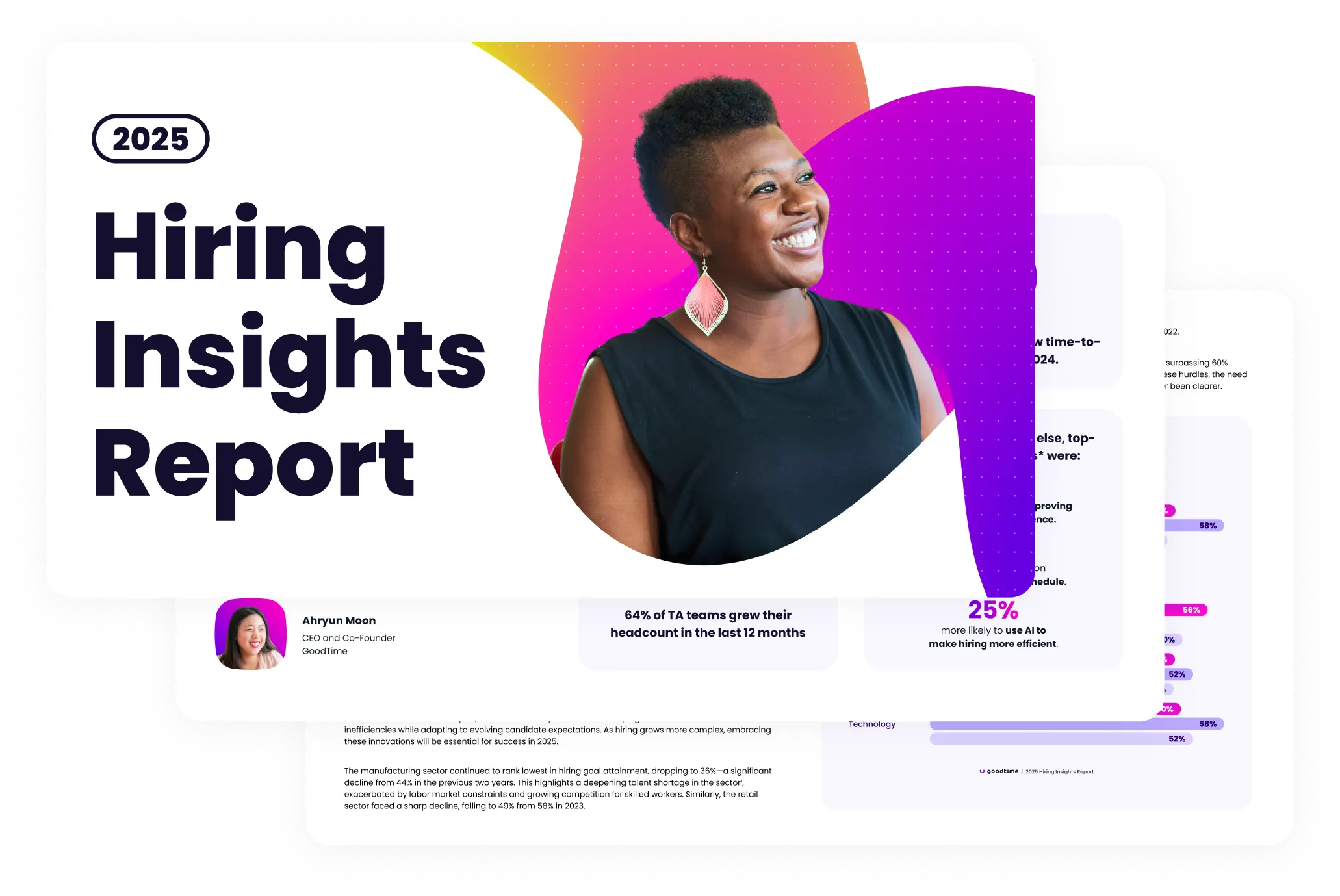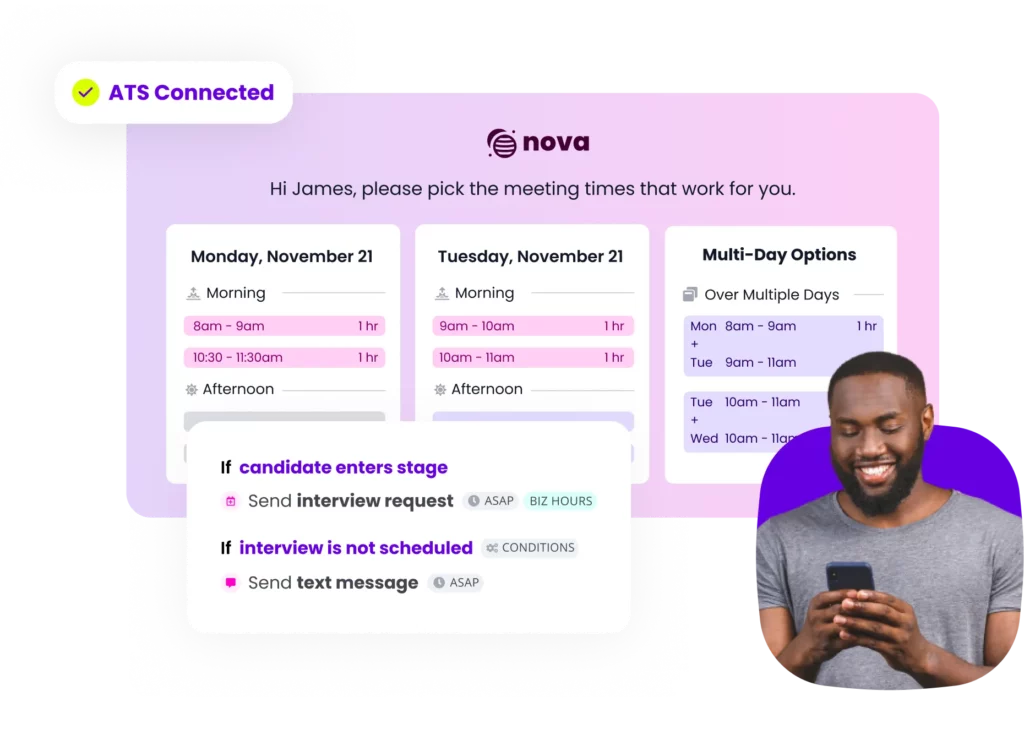When we talk about recruitment, there’s obviously the human element — connecting with candidates, building relationships, and negotiating offers. But there’s also the recruitment metrics — the key data that tells the story of how successful you are at making the right hires, quickly.
And it’s not just about measuring past performance. When you have the right visibility, recruitment metrics not only reveal the effectiveness of your hiring strategies, but also highlight opportunities for optimization and innovation. In today’s data-driven world, understanding which metrics to track and how to leverage them can make the difference between a good hiring strategy and a great one.
It’s all about striking the right balance between human intuition and data-driven decisions. Dallas Frazer, former Recruitment Operations Lead at Shopify and now Customer Success Coach at GoodTime, believes that embracing data does not mean compromising on the human touch. He states, “At its core, recruiting is a fundamentally human-based process. As a result, a lot of recruiters are hesitant to become data-driven, or to standardize and automate processes for fear it will somehow make their process less human. That couldn’t be further from the truth. Optimizing the technical or tedious parts of your recruiting process frees up time for you to focus on those essentially human tasks, and data tells you what areas are most in need of improvement.”
In this comprehensive guide, we will delve into the key recruitment metrics that talent acquisition professionals should monitor, understand why these metrics matter, and explore how technology can help in making sense of the data to improve hiring outcomes. With insights from experts like Dallas, this article aims to equip you with the knowledge to not only track these metrics but to also interpret and act on them effectively.

Unlock 2025’s top hiring strategies: Insights from 500+ TA leaders
Be the first to uncover deep hiring insights specific to your sector — straight from the highest-performing TA teams.

Understanding recruitment metrics
The metrics you choose to measure and focus on serve as the backbone of any data-driven recruitment plan, and provide tangible evidence of how well recruitment processes are functioning and where there may be room for improvement. But before diving into the specific metrics, it’s crucial to understand their broader categories and the roles they play.
4 primary categories
- Efficiency metrics: These metrics help quantify how quickly and efficiently the recruitment team operates. Common examples include time to fill and time to hire, which measure the speed of the recruitment process from job requisition to job acceptance.
- Effectiveness metrics: These are focused on the quality and outcomes of the recruitment efforts. Metrics such as quality of hire and offer acceptance rate fall into this category, helping teams assess the impact of their hiring on the organization.
- Cost metrics: These metrics evaluate the financial impact of the recruitment process. Cost per hire is a critical measure here, providing insight into the total expenses involved in acquiring new talent.
- Satisfaction metrics: Candidate and hiring manager satisfaction rates are vital for understanding the human element of the recruitment process. These metrics shed light on the overall experience for both parties involved, which can significantly influence an organization’s ability to attract top talent.
Not sure where to start? Dallas says anywhere is better than nowhere: “Tracking any recruitment metrics is undoubtedly better than tracking none at all. It’s surprising how many organizations operate in the dark, simply because they’re unsure of what metrics to begin tracking.” He advises teams to first understand the volume of candidates they are bringing in and the time required by the recruiting team and interviewers to assess each candidate. This initial step provides a foundation for more advanced measurements and strategic adjustments.
Why track recruitment metrics?
Hopefully it’s becoming clear already, but just in case, here are some of the key benefits you can expect from better visibility into your hiring metrics:
- Improved decision making: By analyzing recruitment metrics, teams can make informed decisions that enhance the efficiency and effectiveness of their hiring processes.
- Resource optimization: Metrics allow teams to allocate resources more effectively, reducing wasteful spending and focusing efforts where they are most needed.
- Enhanced candidate experience: Understanding the recruitment process from a data perspective helps in refining candidate touchpoints, leading to better candidate experiences and higher engagement rates.
- Strategic business alignment: Recruitment metrics help ensure that the talent acquisition strategy aligns with broader business objectives, supporting overall organizational growth and success.
Dallas emphasizes the transformative power of integrating technology with these metrics: “The beauty of a hiring automation platform like GoodTime is that you can see all the essential recruiting metrics at a glance, but you can also break it down and see how long each stage is taking and where the bottlenecks are.”
Key recruitment metrics to track
When we surveyed 525 TA leaders about the hiring metrics they found to be the most important, overwhelmingly they pointed to quality of hire as their north star.
And of course it is, right? Ultimately, hiring quality talent is the most important thing for a TA team. The problem is that measuring quality of hire isn’t straightforward. That’s why it’s important to have a mix of key performance indicators that ultimately give you an idea of the quality of your hires, but also where your processes need to be improved.
Below are the key metrics that every talent acquisition team should track to ensure they are maximizing their recruitment efforts.
1. Time to fill
This metric measures the number of days from when a job requisition is posted until an offer is accepted. It provides a snapshot of the overall speed of the hiring cycle. Dallas notes, “Start with the basics — understand the number of candidates you’re bringing in, and how much time is required of your recruiting team and your interviewers to assess each candidate. If you can understand your time investment per hire, you’re off to a great start.” A shorter time to fill can indicate a more efficient recruitment process, but it’s crucial to balance speed with the quality of hires.
2. Time to hire
Closely related to time to fill, time to hire focuses on the period from when a candidate applies or is sourced until they accept the job offer. This metric helps identify where delays occur in the hiring process, such as slow feedback from interviewers or delayed decision-making. Platforms like GoodTime can significantly enhance visibility into each stage of the hiring process, allowing teams to pinpoint and address these delays effectively.
Dallas highlights the strategic importance of this metric, “One of the key metrics recruiters will want to track is time-to-hire. If you find your process dragging on for longer than necessary, it’s a clear sign you might be investing too much time and effort in certain stages. It’s also crucial to compare these timings across different roles for context.”
Understand the difference between time to fill and time to hire?
Let’s break it down one more time. Time to fill and time to hire are sometimes (incorrectly) used interchangeably, but there’s an important distinction between them that shouldn’t be missed:
- Time to fill measures the number of days from when a job requisition is posted, capturing the overall speed of the hiring cycle.
- Time to hire focuses on the period from when a candidate applies or is sourced until they accept the job offer, illustrating delays in the hiring process, such as feedback and decision-making delays.
Still a little confused? Read our full breakdown of time to fill vs time to hire.
3. Quality of hire
This metric evaluates the value new hires add to the company, often measured by their performance and tenure at the company. Quality of hire is influenced by various factors, including the effectiveness of the recruitment process and the alignment of the hire with company culture and role requirements.
Craig Pyke, Director of Talent Acquisition at Rivian recommends a simple approach to measuring quality of hire as a function of talent retention: “You can look at attrition within the first 90 days as one indicator of quality of hire,” he shares. “And when you combine exit survey data of why they’re leaving with the factor of them attriting within 90 days, you can really start to pinpoint if that’s a TA challenge or if that’s a challenge somewhere within the business. That’s super, super important.”
4. Employee turnover rate
Speaking of retention — the employee turnover rate measures how often employees leave the company and need to be replaced within a specific period. This metric is crucial as it indirectly reflects the success of the recruitment process and the overall satisfaction and fit of employees within the company.
Dallas points out, “Employee turnover is a really undervalued metric for many recruiting teams. Really, retention is the ultimate proof that you’ve hired the right person. Unfortunately, it’s often poorly tracked because after hiring, many recruiting teams stop tracking a candidate, and they’re passed completely to HR.”
5. Candidate satisfaction
This metric measures the satisfaction of candidates with the recruitment process, from application through to onboarding. High candidate satisfaction can enhance an employer’s brand and attract more high-quality applicants. It is also a critical factor in whether a candidate accepts a job offer. Dallas suggests, “If you can make the process enjoyable or at least respectful and straightforward, candidates are more likely to view the company positively, regardless of the outcome.”
6. Cost per hire
Cost per hire includes all costs associated with hiring a new employee, such as advertising fees, recruiter salaries, and any third-party service fees. Keeping the cost per hire reasonable without compromising on quality is essential for maintaining the efficiency of the recruitment process.
Dallas emphasizes the financial implications of this metric: “Cost per hire is always so much greater than the cost of retention, and when you examine your recruiting processes, it becomes clear why. Think about hiring roles with specialized skill sets, like backend engineers for example. The people who are going to assess these candidates’ technical skills are going to be other backend engineers. Those people’s time is expensive, so the time — and thus money — spent in a hiring process can escalate pretty quickly.”
7. Offer acceptance rate
This metric tracks the percentage of job offers accepted by candidates. A low offer acceptance rate could indicate issues with the compensation package, the candidate experience, or the employer’s brand. It provides critical insight into the effectiveness of the recruitment messaging and the competitive position in the job market.
Each of these metrics provides valuable insights into different aspects of the recruitment process, enabling teams to make data-driven decisions to streamline their talent operations and enhance overall recruitment effectiveness.
Leveraging technology to track and improve metrics
Leveraging technology is no longer just an option but a necessity for optimizing recruitment processes. Advanced tools can significantly streamline the tracking and analysis of key recruitment metrics, enabling talent acquisition teams to make more informed decisions and improve hiring efficiency. By integrating tools like GoodTime, recruitment teams can not only track these critical metrics more efficiently but also gain deeper insights that help refine their hiring processes and improve both candidate and employee experiences.
The role of technology in tracking recruitment metrics
Solutions like GoodTime not only automate interview scheduling and tracking but also offer deep insights into each phase of the recruitment process. Such platforms provide real-time data analysis, which is crucial for understanding talent acquisition trends, identifying issues early, and continuously refining recruitment strategies.
“The beauty of a hiring automation platform like GoodTime is that you can see all the essential recruiting metrics at a glance, but you can also break it down and see how long each stage is taking and where the bottlenecks are,” shares Dallas. “GoodTime shows you exactly what parts of your process can be improved to save you time and money.”

See GoodTime’s insights dashboard in action in the quick demo below:
Key features of recruitment tech
Here’s what you should look for when evaluating recruitment metric tracking platforms:
- Automated data collection: Tools automate the gathering of data across various stages of the hiring process, reducing manual input errors and freeing up time for recruiters to engage more with candidates.
- Customizable dashboards: Most platforms provide customizable recruiting metrics dashboards that display key performance indicators (KPIs) in an accessible and visually engaging format. This feature allows teams to monitor their performance against set goals continuously.
- Predictive analytics and AI-powered recommendations: Some advanced tools use predictive analytics to forecast future hiring needs based on historical data. This can be particularly useful for planning resources and budgets more effectively.
- Seamless integrations: The ability to integrate with existing Applicant Tracking Systems (ATS) and other HR software ensures that all data is centralized and accessible, enhancing the accuracy of metrics and insights.
Implementing technology to enhance recruitment metrics
Implementing technology solutions should be a strategic decision, guided by specific goals and needs. Here are some steps to ensure effective implementation:
- Define objectives: Clearly define what you hope to achieve with the technology, such as reducing time to hire, lowering cost per hire, or improving candidate experience.
- Select appropriate tools: Choose tools that best meet your defined objectives and integrate seamlessly with your existing systems.
- Train your team: Ensure that all users are adequately trained on how to use the new tools. This includes understanding how to interpret the data provided and how to leverage it for decision-making.
- Monitor and iterate: Continuously monitor the outcomes to ensure the technology is meeting your needs. Be prepared to make adjustments as necessary to optimize the use of technology in your recruitment processes.
Dallas sums up the critical role of technology in modern recruitment: “If you don’t have something like GoodTime, you can still piece together some metrics like time-to-hire by digging into your ATS, or tracking via a spreadsheet, but it’s going to be a manual effort. It’s also going to be predicated on your company already having a very consistent and standardized recruiting process. Without that consistency, you’re going to have bad data, and therefore, bad insights.”
Final thoughts and the path forward
Throughout this comprehensive guide, we’ve explored the critical importance of recruitment metrics and the significant advantages they offer in optimizing talent acquisition strategies. From understanding what metrics to track and why they matter, to leveraging cutting-edge technology to enhance these measurements, the goal has been to equip talent acquisition professionals with the knowledge and tools they need to succeed in a competitive hiring landscape.
Recruitment is a complex and dynamic field, requiring a balance between human intuition and data-driven decisions. As highlighted by Dallas Frazer, adopting a data-oriented approach does not strip away the human aspect of recruiting; rather, it enhances it by freeing up valuable time for engagement and meaningful interactions. By automating and optimizing the technical components of the recruitment process, teams can focus more on connecting with candidates and ensuring a fit that benefits both the individual and the organization.
5 keys to success
- Embrace data-driven recruitment: Start by integrating basic metrics tracking into your recruitment processes if you haven’t already. Establish benchmarks and continuously measure your performance against these indicators.
- Leverage technology: Invest in the right technological tools that align with your strategic goals. Platforms like GoodTime can provide invaluable insights into your recruitment operations, offering clarity and control over your processes.
- Continuous improvement: Recruitment metrics should not be static. Regularly review and adjust your strategies based on the data you collect. Use insights gained from analytics to drive improvements and innovate your approach.
- Stakeholder engagement: Keep all stakeholders informed about the benefits of tracking recruitment metrics. Show how these metrics directly contribute to the organization’s success by improving hiring quality, reducing costs, and enhancing candidate experiences.
- Training and development: Ensure your team is well-equipped to use new technologies and understand recruitment analytics. Continuous learning and adaptation are key to maintaining an effective data-driven recruitment strategy.
Remember your goals above all else
Remember that the ultimate goal of tracking recruitment metrics is not just to fill positions quickly or at the lowest cost, but to find the right candidates who will grow with your company and help drive its success. Looking to prioritize metrics in your strategy? Start with our free recruitment plan template!
For those looking to deepen their understanding or improve their recruitment processes, exploring solutions like GoodTime can provide the tools necessary to transition into a more strategic, data-focused approach.
Go beyond data — get AI-powered recommendations
GoodTime shows you your most important insights, but also makes specific, actionable recommendations that make you look like a genius.





